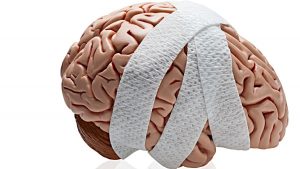After a head injury, people often notice a change in their ability to understand and communicate. This is often a sign of an acquired auditory processing disorder.

Auditory processing refers to what we do with sound once we hear it. A person can have perfectly normal hearing sensitivity and pass a basic hearing test but still struggle to process what they hear effectively. This is because basic hearing tests only look at the functioning of the peripheral hearing system (outer, middle, and inner ear) to rule out a hearing loss. It is important to also consider how efficiently and accurately the person can process sound after it travels from the inner ear, through the brain stem and up to the auditory portions of the brain.
A person with an auditory processing disorder (APD) cannot process what they hear in the same way other people do. Something interferes with the way the brain recognizes and interprets speech. An auditory processing disorder can only be identified by an audiologist through a battery of tests sensitive to abnormalities in the central auditory nervous system.
A traumatic brain injury (TBI) is caused by a bump, blow or jolt to the head or a penetrating head injury that disrupts the normal function of the brain. The severity can range from mild (commonly called a concussion, with a brief change in mental status or consciousness) to severe (an extended period of unconsciousness or amnesia after the injury) and may impact many areas such as memory and reasoning, sensation, communication, and emotion/personality changes.
It has been estimated that over 50% of individuals with traumatic brain injury may have an auditory processing disorder (Musiek et al 2004). Even minor head injuries can cause damage to the central auditory nervous system. However, imaging techniques and medical procedures, may fail to detect the neural damage. Following a concussion, significant central auditory deficits can be present even in the absence of radiologic evidence and in the absence of any obvious deficits within the peripheral auditory system. The injury may resolve physically but still cause auditory processing changes. Deficits are often subtle and may not be detected unless central auditory testing is conducted. Therefore, whenever there is evidence of a known head injury (from blasts, falls, motor vehicle accidents, or sports injuries) or a noticeable change in a person’s listening ability, testing for auditory processing disorder should be considered. This is especially important if a person continues to have trouble after being discharged by their neurologist.
Signs and symptoms of acquired auditory processing disorder following a concussion or traumatic brain injury (TBI)
- Even when listening to the TV close to the full volume you still have difficulty understanding what’s going on.
- Despite trying to listen to your significant other’s requests, you are often in trouble for not paying attention when she/he asks you to do something.
- You tend to be disorganized and forgetful. (i.e. if you accidentally leave your grocery list at home you are puzzled as to what was on it).
- After meeting people at a party, you can’t remember any of their names.
- When you are out with friends at a noisy restaurant or bar conversations are hard to follow, it’s hard to comprehend what is going on, and you no longer enjoy going out like you used to.
- In conversations, you frequently get the feeling that you are missing something.
- You have difficulty understanding speech with foreign accents.
- You have trouble following directions, whether simple or complicated.
- You are unable to concentrate in meetings and are easily distracted by noises such as the tapping of a foot or clicking of a pen.
To maximize successful outcomes, intervention for auditory processing deficits should begin as soon as possible. This includes a combination of auditory training (focusing on remediation of deficit skills to change the way the brain processes information) and teaching compensatory strategies to improve the overall impact on the individual.



